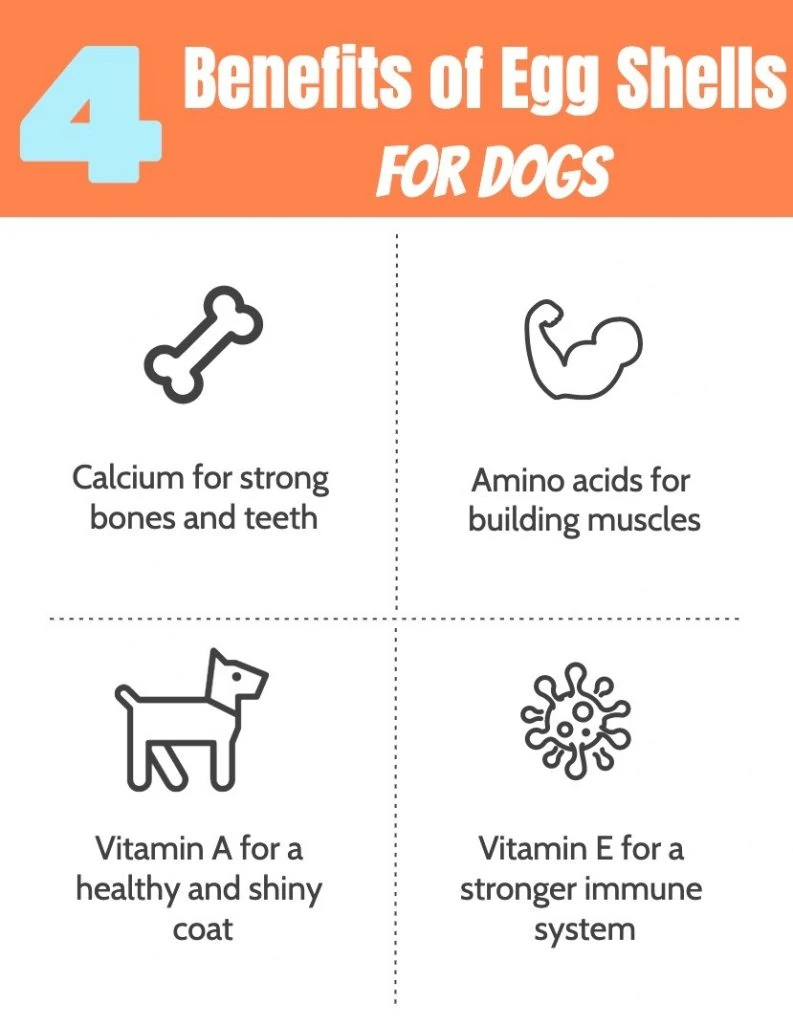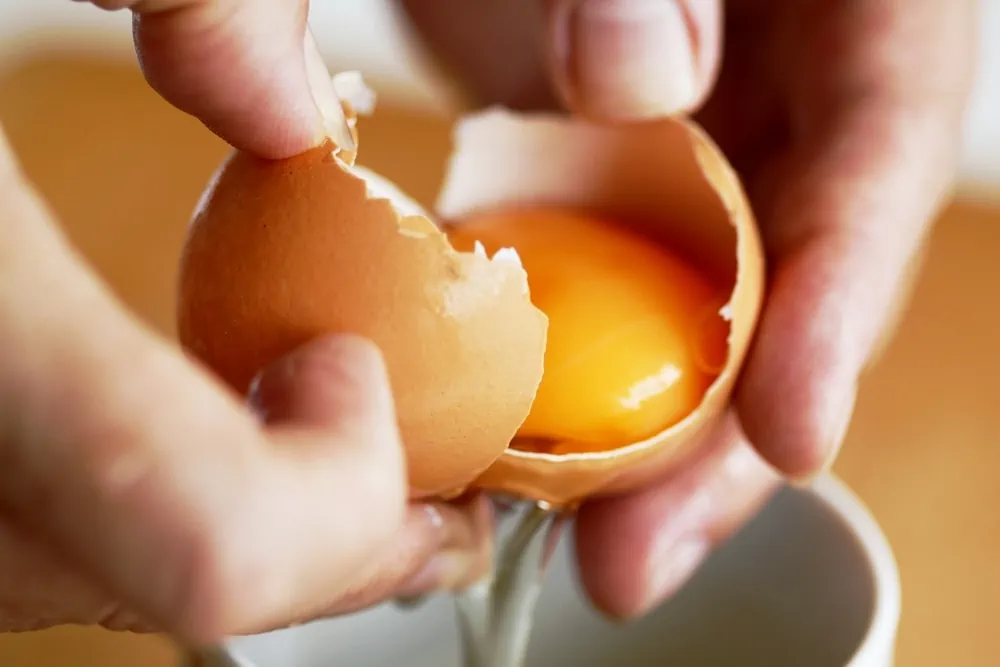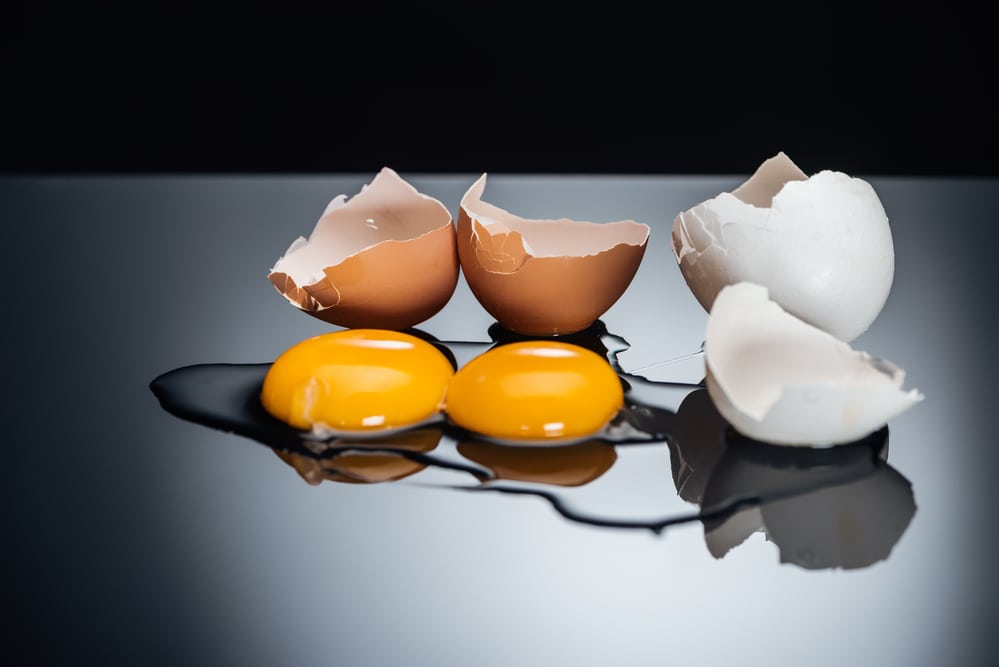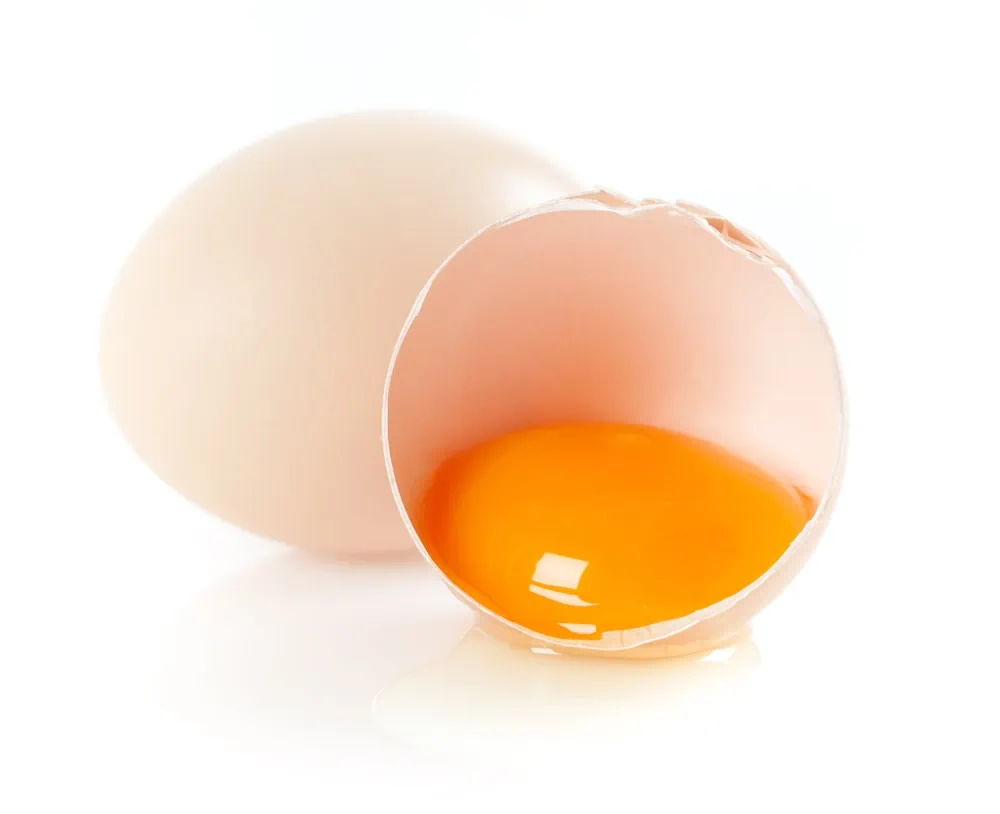Dogs may be our docile pets now, but before that, they were wild wolves. Our pets’ ancestors had to fight to survive. Every day was a fight to make it to the next. Surviving meant eating just about anything.
If a wolf was hungry enough and staring down a nest of eggs, they became a meal. Wolves didn’t bother themselves with separating the egg’s insides from the shell. It was all a meal, shell and all.
Can dogs eat eggshells? Yes, dogs can eat eggshells. Eggshells are a great source of calcium, amino acids, vitamins, and other nutrients. When given to dogs in moderation eggshells can be a healthy addition to their diet.
Benefits of Egg Shells for Dogs
If your first instinct may have been to assume dogs can’t eat eggshells, that’s understandable. The shell of an egg isn’t typically viewed as edible. In fact, it is. You should consider adding shells to your dog’s diet today.

Strong Bones and Teeth
Eggshells are a significant source of calcium. Milk is usually the big calcium star, but eggs are a good source of it as well.
Actually, the majority of an eggshell is compromised of calcium carbonate, or CaCO3 (source). That’s an important nutrient for bone health.
Since they are dense in calcium, powdered eggshells are found in arthritis treatments (source). Previously, eggshells were just one ingredient in common canine arthritic medications.
Now, drug companies have begun to market eggshell membranes as their own product.
An eggshell membrane is the thin clear substance found lining eggshells. When you crack an egg, it’s the mucus-like slime left behind in the shell.
It might not be appealing to look at, but it’s a nutrient-rich material. Humans and dogs commonly take it as a dietary supplement.
Eggshell membranes are effective in easing the symptoms of canine arthritis. In fact, a study can back up this claim (source). In 2015, researchers performed a double-blind study involving eggshell membranes.
The researchers gave 51 dogs eggshell membranes once a day for six weeks. They concluded that the membranes significantly reduced the dogs’ joint pain. The supplement gave the dogs an improved quality of life.
If your dog doesn’t have arthritis, they can still benefit from eggshells. A young dog with calcium-fortified joints is less likely to experience aging problems.
It’s more than the joints. Teeth are big beneficiaries of calcium. The calcium found in chicken eggshells can help keep your dog’s teeth strong and healthy.
According to the American Veterinary Medical Association, periodontal disease is a widespread problem.
Experts estimate that 80% of dogs have signs of periodontal disease by three years old (source). Periodontal disease can be painful and debilitating for canines.
Many people swear by the health benefits of raw diets for dogs. Followers of this diet often give their dogs animal bones for calcium.
If you aren’t comfortable with feeding your dog an animal bone, eggshells make a safer substitute.
Amino Acids
It isn’t just about bones and teeth, though. Eggshells are full of amino acids. Amino acids don’t tend to get the same attention as protein does. Everyone associates protein with building muscle, but not amino acids.
Protein is definitely necessary for muscle growth, but so are amino acids. What food source can give your dog amino acids? Eggshells.
Domesticated dogs require 10 amino acids in their diets to stay healthy (Purina). The amino acids are as follows:
- Arginine
- Histidine
- Isoleucine
- Leucine
- Lysine
- Methionine
- Phenylalanine
- Threonine
- Tryptophan
- Valine
Chicken eggshells contain eight of the 10 necessary amino acids. It is a near-perfect source of amino acids – 80% of the requirements. Arginine is the most abundant in eggshells, followed by Leucine and Lysine.
Arginine has been shown to have heart health benefits. Arginine is a vasodilator, meaning it dilates blood vessels.
It’s been proven to help lower blood pressure (source).
Meanwhile, Leucine is essential in non-human diets. Animals lack the enzyme pathway to create their own Leucine and must consume it in their diet.
Meats and eggs (and the shells!) are a great source of Leucine. This amino acid has been shown to slow the degradation of muscle (source).
Lysine is another necessary amino acid. For its special uses, studies have indicated that Lysine may help lower blood sugar.
This is particularly useful if you have a dog suffering from diabetes. A lack of lysine can lead to anemia and defective connective tissues (source).
Additional Benefits
A diet with eggshells can improve your dog’s immune system. No one wants to see his or her furry best friend feeling under the weather.
Eggshells contain Vitamin E and magnesium. Both of these can help bolster a canine’s immune system. Consider these potential benefits for your dog.
In 2017, a study by Vuong and colleagues found that avian eggshells have anti-inflammatory properties. The researchers studied powdered chicken eggshell membranes.
As a result, they found that the eggshells “possess anti-inflammatory properties that make this material a promising ingredient suitable for use in wound treatment” (source).
A different study also looked at the effects of dietary eggshell membranes. It was found that powdered eggshell membranes were effective in reducing recovery time from exercised-induced joint stiffness and pain (source).
Please note the two studies mentioned above were performed on humans. Funding doesn’t tend to go towards research on dogs.
These benefits may or may not transfer to your dog. Consult with your veterinarian to learn more.
Vitamin E is also an antioxidant (source). It can help lessen the damage caused by aging. This means vitamin E can help prevent the decrease of cognitive abilities in senior dogs. This will keep up your dog’s quality of life as he ages.
Vitamin E is found in eggshells, but also in most senior dog foods on the market (source). It is an important vitamin in the production of fur.
Eggshells can help keep your dog’s coat shiny and healthy. This keeps him not only looking good but feeling good too.
Eggshells also contain amounts of the following nutrients.
- Folic acid – helps with the production of strong cells
- Vitamin B6 – Aids brain development
- Strontium – Can prevent bone loss
- Fluoride – builds strong teeth
- Selenium – Shown to prevent cell damage
How to Feed Your Dog an Entire Egg

You can serve a dog a whole egg, complete with the shell, or you can feed them only the shell. It’s truly up to your personal comfort level.
If you’d like your dog to enjoy a full egg, it’s best to go with a hard-boiled one. The egg only needs to be boiled for three to five minutes.
When boiling the egg, do your best to avoid overcooking. Set a timer if you must. Overcooking an egg can possibly destroy the nutrients. Ultimately, that would defeat the entire purpose.
The only way to check for overcooking is to observe the inside of the cooked egg (source). When halved, a properly cooked hard-boiled egg will have a pure yellow center. If the center has started turning green, it’s overcooked.
When you’re confident that your egg is cooked, you will still want to crack the shell (source). Lightly crack the egg on a bowl or other surface. You don’t want to remove the shell; you just need it cracked all over to make it safer for your dog to eat.
Of course, you can always feed the dog the egg and shell separately. Cooking the egg and serving it and the shells at separate times works. There aren’t any steadfast rules. All parts of an egg have nutritional value.
Your dog may love scrambled eggs! Even if you personally love your eggs with butter and toppings, don’t add these to your dog’s helping.
Your dog can do without those. For the healthiest offering, prepare your dog’s meal with as little additives as possible (source).
Recent health trends recommend humans only eat egg whites and skip the yolk. Your dog isn’t trying to watch his cholesterol levels, though. He can eat egg yolks without fear.
Dogs should eat all parts of an egg, not just the egg whites. After all, beyond the shell, the nutrients your dog needs are found in the yolk, not just the egg whites (source).
Cooking egg shells for dogs? Check this video below:
How to Feed Your Dog an Eggshell
Your dog doesn’t absolutely have to have the innards of an egg in its diet. If you are wary of serving a whole egg, the eggshells are enough. There are a few ways to serve just the shells to your pet.
If you’re preparing your own breakfast, you can put aside the shells as you cook. Do you purchase organic eggs? If so, the shells are ready for your dog to eat as is (source).
If you don’t opt for organic eggs, you will need to boil the shell pieces. Commercial eggs on the market have bacteria and other pathogens on the outside of the shell.
This is why humans shouldn’t eat raw eggs. To be sure, organic eggshells can always be boiled as well.
Boiling the eggshells should kill any illness-causing pathogens. Boiling the pieces of just one eggshell may feel like overkill. Instead, you can save up shells from several days of breakfast and boil all of them at once.
Once they are boiled, the eggshells pieces are safe for your dog to eat. The shell pieces can be given as a treat or alongside a meal.
Some owners mix the pieces in dog food. Others just simply hand the shell to the dog to eat.
Not surprisingly, your dog may not be a fan of eating shell pieces. If you’d still like your dog to enjoy the nutritional benefits of eggshells, you can make them into a powder.
Before making the shells into powder, begin by boiling or even washing your eggshell pieces. 10 minutes of boiling is enough time.
Allow them to dry overnight somewhere safe. Be sure your dog can’t reach the shells until they are ready.
For an even quicker turnaround, place your shell pieces on a baking sheet and dry them in the oven (source).
Aim for 15 minutes in an oven set at 200 degrees Fahrenheit should be adequate. Keep an eye on the shells to prevent burning.
In order to grind your shells into a powder, consider what you have on hand. A blender, food processor, or coffee grinder will work. You must be careful to not grind the pieces not enough or too much.
However, manually using a mortar and pestle will also get the job done. You can even throw the shells in a Ziploc bag and crush them with a rolling pin. These methods save you from having to clean an appliance later.
Once you have your shell powder, sprinkle it on top of your dog’s normal food. If you don’t want your dog to be turned off at the sight of the white powder, mix it well into the food. Luckily, dogs don’t tend to be picky creatures.
If you make enough powder, feel free to bottle the rest up for later. A few eggshells ground up can last for weeks if sprinkled sparingly. You can always include it in your meal as well.
Are There Any Dangers to Dogs Eating Eggshells?

Of course, as you can imagine, there are some dangers to eggshell consumption. As with most food items, it’s a risk/benefit analysis. You can take certain steps to minimize the risk to your dog if this is something you decide to do for them.
Avoiding a Biotin Deficiency
As mentioned before, your dog should consume all parts of the egg. While egg whites are a healthy option for humans, it is not for our pets.
Egg whites contain enzyme inhibitors that bind to biotin. These inhibitors can cause a biotin deficiency (source). Biotin is important for thyroid function, digestion, and healthy skin.
When a dog becomes deficient in biotin, they can have energy issues, hair loss, and a reduced growth rate.
Why does consuming the entire egg prevent biotin deficiency? Mainly, the yolk of an egg is high in biotin.
This counteracts the enzyme inhibitors of the egg white. It’s microbiologic teamwork, essentially.
If you must, for any reason, separate the egg for your dog, err on the side of caution. Feed your dog only the yolk, not the egg white. The yellow center of an egg is a nutrient goldmine.
Still, it is important to note that one serving of egg whites is not going to give your dog a biotin deficiency. Regular consumption of egg whites causes this issue. As with most things in life, egg whites should be enjoyed in moderation.
Risk of Foodborne Illness
Salmonella is also a problem with chicken eggs. While salmonella is a real threat to humans, it’s a dangerous problem for dogs too (source).
Salmonella can be found inside chicken eggs and on the shell. Things like poultry droppings infect eggshells when it is laid (source). It’s an unpleasant thought, but try to consider where chicken eggs land once laid.
Salmonella is rare in dogs. In fact, instances of dogs with salmonella are decreasing every year, according to a 2017 study by the CDC (source).
However, for susceptible animals, salmonella can be devastating. Dogs with prior medical issues are vulnerable to infection. Dogs can experience 7 to 12 days of vomiting and diarrhea from the infection.
The severity of a salmonella infection depends on how much of the bacteria are ingested. It’s best to not risk it. Cooking an egg and shell minimizes the risk of salmonella infection.
Avoiding Excessive Calories
With eggs and all food, too much of a good thing is a bad thing. Eggs and shells should be a supplement to your dog’s diet, not a staple (source). Eggs can easily pack on the pounds.
Your dog’s particular daily calorie needs to depend on his or her weight. For example, a 50-pound dog only requires 700 to 900 calories a day (source). A smaller dog requires even fewer calories.
A single small egg is only 70 calories. A jumbo egg is 90 calories (source). For a human, that’s a mere snack. For a 50-pound dog, that’s 10% of his daily caloric intake. With a small dog, it can be far too easy to exceed their caloric needs.
Your dog may not mind the extra food, but the vet’s scale will surely notice. Consult with your veterinarian if you are unsure of your dog’s caloric needs.
To avoid overfeeding your dog, you can stick with feeding him only the eggshell powder on a regular basis. Full eggs should be considered a “sometimes” treat. Ignore the puppy dog eyes!
**What to do when your dog ate fish food? See if the type of food is toxic for dogs in this guide here!**
Final Thoughts
Humans consider eggs a breakfast staple and it’s easy to see why. Eggs are cheap and easy to prepare.
Eggs can be eaten in so many different ways.They are delicious. Plus, they are a great source of nutrients.
For these same reasons, eggs and their shells are a great addition to any dog’s diet. Shells can be eaten as part of a full egg or they can be ground into a powder.
No matter the method, don’t be afraid to feed your dog some eggshells. The health benefits are numerous and he’ll probably find them tasty!


0 Comments